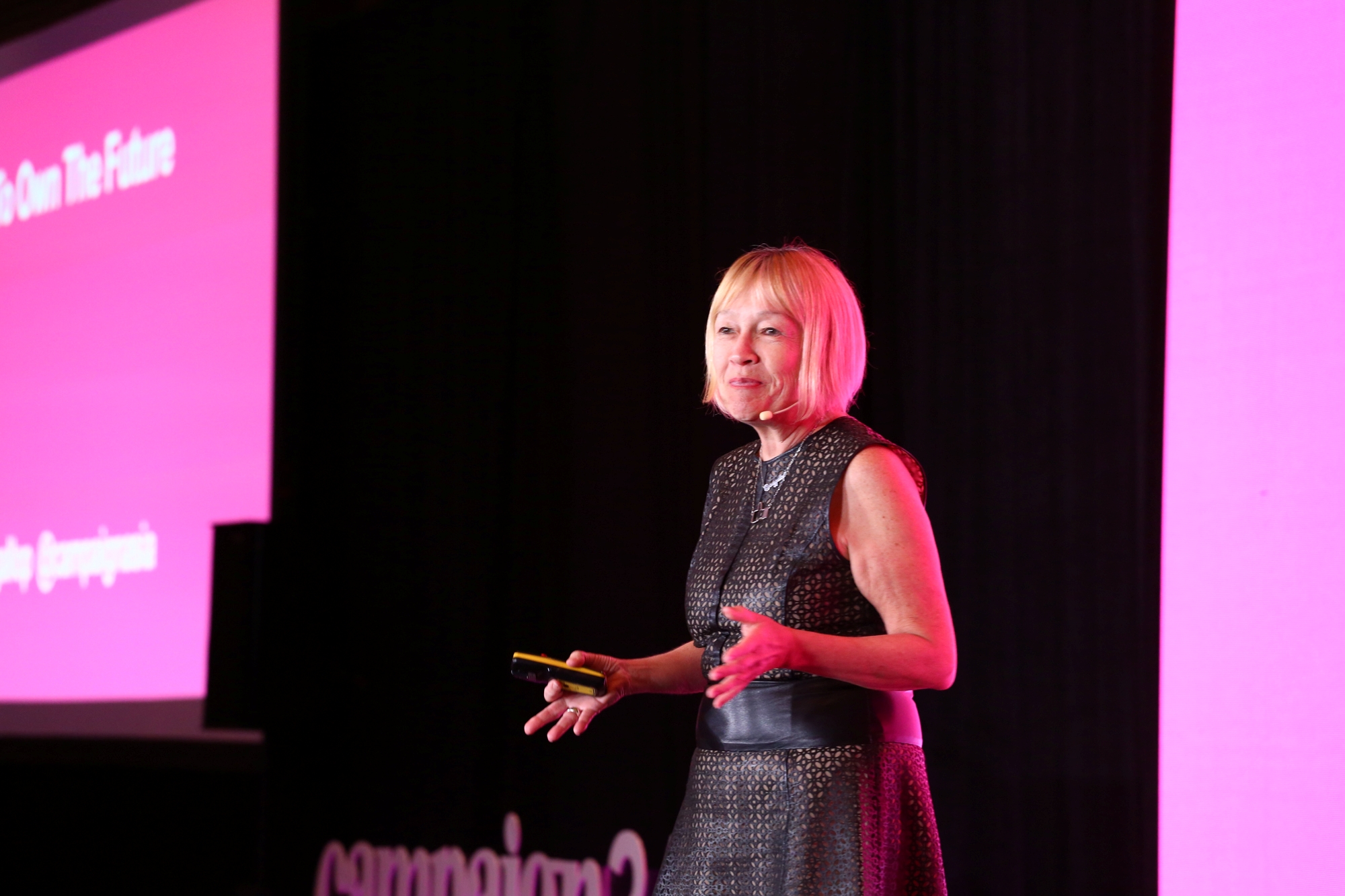Cindy Gallop, the prolific founder and CEO of MakeLoveNotPorn, began the proceeding of day one at Campaign360 by delivering an engaging and enlightening keynote titled ‘How to own the future’.
Gallop began by sharing six essential principles for mastering the future of branding. These are:
- Reinventing aspirations
- Embracing radical simplicity
- Tapping the talent you have
- Welcoming the female lens
- Showing your value
- Making people love advertising
“I am here to talk about re-inventing aspirations,” she began as she delved into her first principle. She shared how agencies traditionally focus on making people want material things like cars and houses. However, today they have a chance to change that and instead encourage people to aspire to a life that allows them to be their best selves. This, she said, can often be done by breaking stereotypes.
One such stereotype is the traditional heteronormative view of marriage, where the man is the breadwinner, and the woman is the nurturing homemaker.
“Today, relationships are more equal partnerships. Hence, agencies have significant opportunities to redefine aspirations to align with these modern realities, also resulting in boosted product sales”, she explained.
In another example, Gallop said one’s age should be celebrated, and used as a source of inspiration rather it being hidden or dismissed.
She said, “I tell everyone how old I am as often as possible. I believe the opposite of what people usually say to counter that age is just a number. I disagree. Your age is a very special number. Because your age is the total of you. Your age is the total of all your experience and all your expertise. Everything you do live to date; your age is what makes you valuable.”
On top of that, she said that brands can relook the idea of sex-appeal and sex from a female lens.
“When people say ‘sex sells’, they typically mean from a male perspective. However, there's a largely untapped potential in how sex can be used to sell from a female perspective,” she said.

Unlocking talent—and eventually, revenue
Moving on to her second principle, Gallop proposed a new advertising approach that prioritises mutual understanding and respect between advertisers and consumers while embracing ‘radical simplicity’ and creativity.
“I’m a big fan of radical simplicity. I like to keep things very, very simple,” she said.
She explained that this can be achieved by agencies, wherever they are in the world, finding answers to three simple questions.
Number one, how can we be more creative?
Number two, how do we make more money?
And number three, how will we be happier?
“I recommend that all of you take these questions back to your own companies and answer them,” encouraged Gallop.
She continued to say that many unlocking talent within companies to allow disruption and creativity to flow is key. As an example, during one-to-one interviews and workshops at companies, she often detects untapped opportunities for increased revenue.
“This is why I emphasise understanding the potential for disruption within your own company or market. When you do so, it's not a coincidence that innovative ideas and new revenue streams emerge, potentially increasing the company's value,” she said.

Who runs the world?
“Women challenge the status quo, because are never it,” said Gallop.
She shared a specific use case where the female perspective is crucial.
“In today's digital landscape, many young, white, male Silicon Valley founders, often overlook the prevalence of online and offline harassment, abuse, sexual assault, and violence that particularly targets women, people of colour, LGBTQ individuals, and those with disabilities,” she said. “There is a failure to proactively design prevention measures on these platforms, leading to ongoing issues. The reality is that only 1.7% of all venture capital funding last year went to female founders. This lack of representation means we have yet to fully explore the potential of the internet when it is designed and built with a female lens at scale.”
Gallop underscored the importance of involving women in the development and growth of AI and said the future of AI relies on women for three main reasons. Firstly, women play a crucial role in enhancing AI's safety, especially in addressing the growing threat of deepfake content that pose significant risks worldwide. Second, women constitute half of the population, contributing significantly to economic advancement and innovative developments. Third, women's achievements in sectors such as manufacturing and agriculture are generating valuable use cases that not only benefit society but also enhance AI's profitability.
The ’devaluation’ of advertising
Moving on to her fifth principle, Gallop talked about how the industry has colluded to its devaluation for decades.
“The value others place on us often mirrors the value we perceive for ourselves. This dynamic extends to how clients perceive and value our work. Essentially, we have been complicit in diminishing our worth,” she said at the forum. “It's time to reclaim our understanding of the value we bring and our position in the digital landscape.”
She added that advertisers should carefully consider how they engage with the big tech platforms and define their role in the tech world.
Gallop noted that there is a broader sentiment that advertising is inherently negative. This perception, according to her, is largely due to how ads are presented. If advertising were communicated better, perhaps people wouldn't feel manipulated or deceived.
“People may dislike advertising in general, but they can love specific ads. To ensure a prosperous and innovative future, we must strive to make people appreciate advertisers. This shift is entirely feasible,” said Gallop.
She concluded by saying, “The core idea is to make people love advertising, thus revolutionising the existing adtech model and reclaiming our value. Alan Kay's words resonate with me: ‘To predict the future, you have to invent it’.”
Click here for content highlights at Campaign360 2024.











